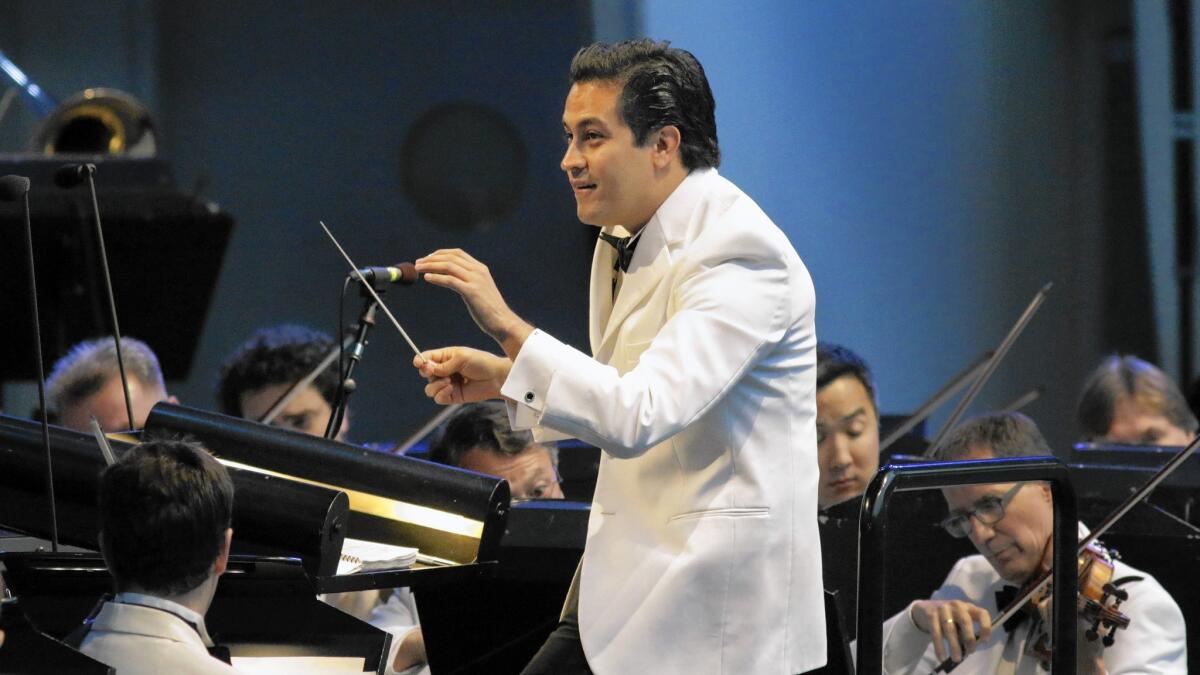Review: Substitutes shine in âTraviataâ at the Hollywood Bowl

No day passes in which someone somewhere doesnât send a news release announcing a cast change in an opera. There may be advance notice, or companies may be forced to make frantic phone calls 15 minutes before curtain. Stars can be born this way. Performances can also be compromised this way.
The Los Angeles Philharmonicâs annual concert opera performance at the Hollywood Bowl, Verdiâs âLa Traviataâ Sunday night, had two newsworthy changes. In June, the British conductor Daniel Harding withdrew for family reasons. He was speedily replaced by Diego Matheuz , a former Dudamel fellow with the L.A. Phil and now music director of La Fenice in Venice, one of Italyâs major opera companies. He wound up making his Hollywood Bowl debut on his 31st birthday.
The Bowl debut of a compelling young American tenor, Stephen Costello, on the other hand, happened with much less notice, the original tenor, Francesco Demuro, having come down with tracheitis a few days ago. This was a fitting switcheroo. In December, Costello had become ill shortly before he was about to go onstage in a âTraviataâ at the Metropolitan Opera, and Demuro stepped in at literally the last minute.
SIGN UP for the free Essential Arts & Culture newsletter >>
Venera Gimadieva, a young Russian soprano who had considerable success last year in âTraviataâ both at Fenice with Matheuz and at Glyndebourne in England, made her eagerly awaited Bowl debut as advertised. On Sunday, she brought an opulence and vocal security to the consumptive Violetta as advertised.
But it was Matheuz for whom curiosity was the greatest. He has been hailed as the next Gustavo Dudamel. They are from the same city in Venezuela, Barquisimeto. They grew up together and, like Dudamel, Matheuz is a protĂŠgĂŠ of El Sistema founder JosĂŠ Antonio Abreu. Matheuz is associate conductor of the SimĂłn BolĂvar Symphony Orchestra of Venezuela, of which Dudamel is music director.
While he can be fiery conducting young Venezuelan musicians, Matheuz was not that in âTraviata.â Seldom thought of as a conductorâs opera but as with all Verdi, âTraviataâ can succeed or fail from the podium. The one thing that the greatest Italian Verdi conductors, from Toscanini to Riccardo Muti, have in common is the attention to detail, and that is a tradition that Matheuz has worthily embraced.
No opera is harder to start at the Bowl than âTraviata.â The airy opening in quiet, pious strings is sure to be lost as picnickers settle down and latecomers scurry to their seats. Without the slightest fuss, Matheuz signaled luminosity and, around me, cellphones, with their less magical luminosity, were turned off faster than usual.
There was liveliness to Matheuzâs performance. The drinking song offered a suitable stimulus for audience wine consumption. Matheuz pushed the Los Angeles Master Chorale almost to its limits in its Act III party numbers.
Mainly, though, Matheuz exhibited caution and care. Opera at the Bowl is put on with far less preparation than in the opera house or even concert opera in the concert hall. Amplification favored singers, often keeping the orchestra in the background. Still, Matheuz brought an immediacy to fleshy instrumental passages and kept the performance on unerring rhythmic footing.
What was lacking was a sense of theater, mainly for lack of stage direction. The Bowl may be willing to go all out with âSpamalotâ but not for real opera.
Singers came and went awkwardly. They stood and sang. And large video screens magnified every facial non-gesture. Gimadieva came across as pat. She often signaled a vocal flourish with a smile, as a gymnast might just before executing a spectacular feat.
The amplification makes it hard to appreciate the size of the voice, but Gimadievaâs dark, resonant yet capably agile soprano must be appreciable. She appeared to be consciously scaling down to achieve intimacy or frailty. But she was always impressively in control.
Costelloâs Alfredo was deeper than some, more sensitive than most and vocally convincing. He looked eager for drama and hampered by a lack of opportunity to interact with others. As Alfredoâs father who fouls up the romance between his son and Violetta, Simone Piazzola, a fluent light baritone, was more stodgy.
There was a surprising luxury casting among the smaller parts. Kelley OâConnor (who had brilliantly starred in the L.A. Philâs production of John Adamsâ âThe Gospel According to the Other Maryâ) found a fuller character in Violettaâs demimonde friend, Flora, than one typically encounters in a full production of the opera. Evan Hughes, best known for daring contemporary music (as is OâConnor), was imposing as the Baron Douphol, who duels with Alfredo.
Still, the news is Matheuz. Under him, Fenice has become one of the most stimulating companies in Italy, including working with visual artists involved in the Venice Biennale. The Bowl âTraviataâ was a hint of what he is up to. We need more than that.
ALSO:
Review: Pianist Yuni adds some flair, but his Beethoven still lacks drama at Bowl
Review: New York Philarmonic sticks with American classics at Santa Barbara Bowl
âScalia/Ginsburgâ opera underscores how opposites can be in harmony
More to Read
The biggest entertainment stories
Get our big stories about Hollywood, film, television, music, arts, culture and more right in your inbox as soon as they publish.
You may occasionally receive promotional content from the Los Angeles Times.











